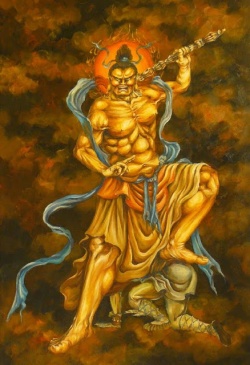The Kitchen God and the Bodhisattva King of the Kinnaras
The Kitchen God, or the God of the Stove (灶神 Zaoshen), is an ancient deity of the hearth (i.e. the brick stove area of the house), and in all homes in olden times, a picture of him (sometimes together with his wife) was pasted on the wall near the stove, or a wooden tablet inscribed with his name was installed somewhere in the kitchen, where votive offerings and libations would be regularly made. The Kitchen God is also known as the Lord of the Stove (灶君 Zaojun); Perfected Lord Who Controls Destiny (司命真君 Siming Zhenjun); and Lord of the Stove of the Eastern Kitchen that Controls Destiny and Determines Fortune (東廚司命定福灶君 Dongchu Siming Dingfu Zaojun]]).
In ancient times, the hearth was considered a very important and central part of the home because it was where food and warmth were provided to the family. It was believed that the Kitchen God watched over the household, and at the end of the year, he would return to heaven to make a report to the Jade Emperor (the king of all gods) and disclose the good and bad deeds of each family in the mortal realm. Depending on local and regional customs in pre-modern China, the 23rd or 24th day of the 12th Chinese lunar month (the last month of the year, right before the Chinese lunar new year) was the day that Chinese households sent off the Kitchen God (送灶 Songzao; or 辭灶 Cizao) back to heaven.
Before sending off the Kitchen God by burning his paper image, honey or molasses would first be smeared on his lips to sweeten his mouth so that his words to the Jade Emperor would be nothing but sweet sounding words. If a wooden tablet or shrine was used in the kitchen instead, sweets and cakes would be offered to him. Another practice was smearing sticky maltose syrup on his mouth to make his teeth stick in the hopes that he could not speak about the bad deeds of the family. After the Kitchen God’s report was made to the Jade Emperor, each person or family would receive merits or demerits, based on their deeds throughout the past year, which would then determine their fortune for the coming new year. On New Year’s Eve (the last day of the year, right before lunar New Year’s day), families would welcome/receive the Kitchen God (接灶 Jiezao) back from heaven by reinstalling a new paper image of the Kitchen God in the kitchen, or by presenting offerings again to his wooden tablet or shrine.
The Kitchen God is well known in Taoist and popular folk religious practice, but its adoption into Chinese Buddhism as the Bodhisattva King of the Kinnaras (緊那羅王菩薩 Jinnaluo Wang Pusa), also called the Venerable Celestial Kinnara King (緊那羅王尊天 Jinnaluo Wang Zuntian), is less well known. In Buddhism, a kinnara (緊那羅 jinnaluo) is a type of spirit-being included in the Eight Categories of Supernatural Beings (天龍八部 Tianlong Babu). Kinnaras are celestial musicians that are depicted as half-human and half-horse in Indian religious culture, or half-human and half-bird in Southeast Asian religious culture. However, in Chinese Buddhism, their representation does not seem to possess any animal characteristics.
As any cultural historian or anthropologist familiar with the history of Buddhism knows, the Buddhist religion was always successful in establishing itself in new countries as its transmission spread across East Asia due to its flexibility in accommodating traditional local beliefs and customs. In the case of China, the traditional veneration of the Kitchen God was incorporated into the Chinese Buddhist religion based on a legend involving an incident at the famous Shaolin Monastery in Henan province. According to the Historical Records of Henan Prefecture (河南府志 Henanfu Zhi), in the year 1350 during the Yuan dynasty, the Red Turban Army (紅巾軍 Hongjinjun) made an attempt to attack the Shaolin Monastery. A monk who worked in the monastery kitchen came out to defend the monastery brandishing a raised wooden staff that was ablaze in flames. A manifestation of the Kinnara King appeared, and the fierce looking emanation scared away the Red Turbans. The monks later erected a worship hall in his honor, and he was given the honorific title The Bodhisattva King of the Kinnaras.
The Kinnara King also came to be identified with the role of the Kitchen God because of his connection to the kitchen in the legend, so he was also given the title The Bodhisattva Who Supervises the Vegetarian Diet (監齋菩薩 Jianzhai Pusa). In Chinese Buddhist temples, the image of the Kinnara King is always depicted as a giant and wrathful looking warrior, and his image is usually placed in or near the kitchen. His function is almost analogous to that of the Kitchen God’s, although his figure is also seen as more of a guardian protector. In the Chinese Buddhist tradition, the 23rd day of the 12th lunar month (the same date that the Kitchen God is sent back to heaven) is also observed as the Birthday of the Bodhisattva Who Supervises the Vegetarian Diet (監齋菩薩聖誕 Jianzhai Pusa Shengdan).
In a narrower sense, the duties of both the Kitchen God and the Bodhisattva Who Supervises the Vegetarian Diet involve watching over food and kitchen related matters, but in a wider sense, their duties also involve watching over the health and well-being of the entire family or monastic body.
So whether in his traditional Taoist and folk guise, or in his wrathful Buddhist guise, may he always guarantee everyone healthy and plentiful food from the kitchen!
